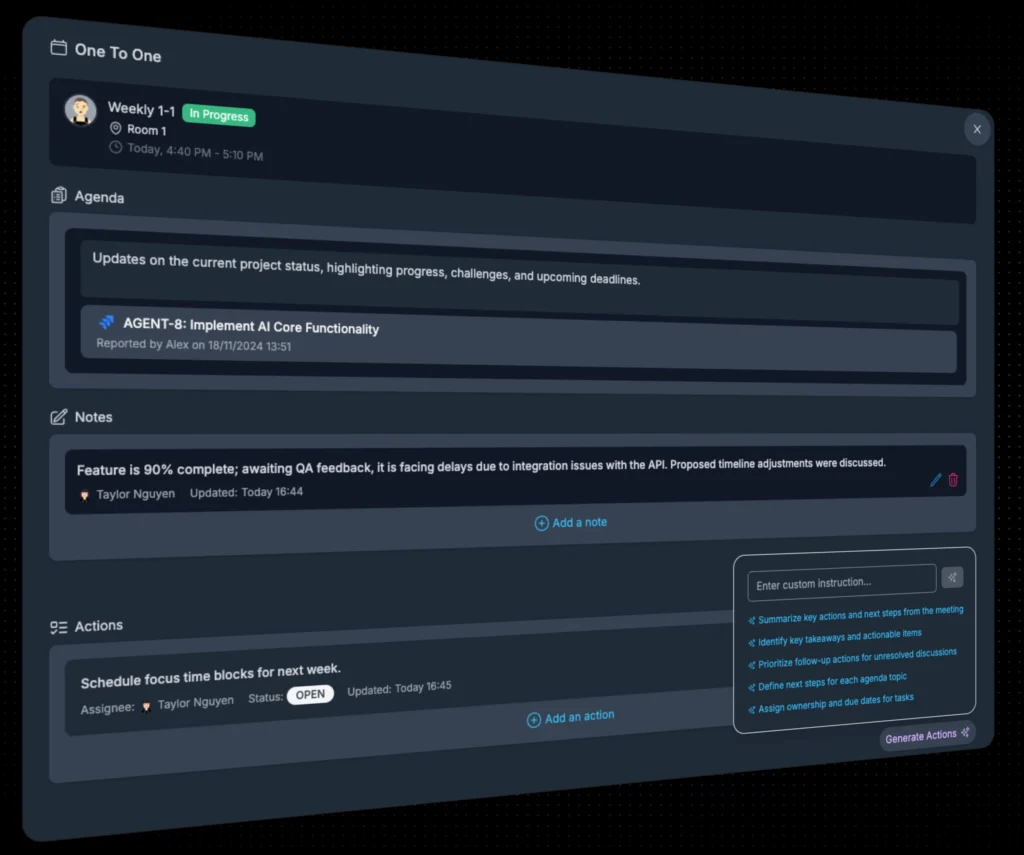What exactly is a one-on-one?
A one-on-one (1:1) is a meeting between a manager and their direct report, designed to create a dedicated space for open, meaningful conversations. Unlike team updates or project discussions, a 1:1 is all about the individual—it’s their moment to share challenges, celebrate wins, and plan for what’s next.
Done right, a 1:1 goes beyond basic updates to focus on:
- Building trust: A space where employees feel seen, heard, and valued.
- Career growth: Conversations about goals, skills, and aspirations that might not come up otherwise.
- Removing roadblocks: Addressing frustrations or challenges before they become bigger issues.
- Aligning priorities: Connecting individual efforts to the broader goals of the team and organization.
Think of a 1:1 as a regular system check—not flashy, but essential for keeping things running smoothly.

Why some people doubt the value of 1:1s
Opinions on 1:1s can be divided. Some leaders swear by them as the cornerstone of great management. Others see them as optional or inefficient, especially when managing large teams.
Here’s the truth: 1:1s are always valuable, but they need to be tailored to the team and context.
- For smaller teams: Weekly or biweekly deep dives allow for detailed conversations on growth, challenges, and alignment.
- For larger teams: Group sessions, quarterly check-ins, or data-driven approaches can ensure everyone gets the support they need without overwhelming managers.
The key is recognizing that skipping 1:1s entirely isn’t the answer. It’s about adapting the format to fit your team’s dynamics while keeping the focus on connection and growth.
Why 1:1s are non-negotiable
Far from being just another meeting, 1:1s are a crucial part of fostering individual growth and building strong teams. Here’s why:
- Career development: 1:1s provide the space for employees to explore their goals, develop skills, and identify opportunities for growth. This clarity builds engagement and motivation.
- Building culture: Open, consistent communication strengthens trust and creates a culture of collaboration and accountability.
- Retention and alignment: Regular 1:1s ensure employees feel valued and connected to the organization’s mission, reducing turnover and boosting overall team cohesion.
When organizations invest in these conversations, the ripple effects are felt across productivity, engagement, and culture.
How tools are reshaping the 1:1 experience
Managing effective 1:1s can feel daunting, especially with large or distributed teams. This is where technology steps in, turning traditional 1:1s into structured, impactful conversations.
Here’s what modern tools offer:
- Guided agendas: Pre-built templates keep conversations focused on what matters most—performance, growth, and challenges.
- Real-time insights: Dashboards consolidate performance metrics, feedback, and progress, providing clear, objective data to ground discussions.
- Personalized recommendations: AI can surface actionable insights, like skill gaps or growth opportunities, tailored to the individual.
- Shared follow-ups: Digital notes and action items ensure accountability and keep everyone on track after the meeting.
Technology doesn’t replace the human connection of a 1:1—it amplifies it by making preparation easier and conversations more focused.

Making 1:1s work for your team
There’s no one-size-fits-all approach to 1:1s, but the best ones share a few key traits:
- Clarity: Both sides come prepared with clear goals and priorities.
- Focus: Time is spent on meaningful discussions, not vague updates.
- Trust: Employees feel comfortable sharing challenges and opportunities.
- Action: Every meeting ends with actionable next steps.
Whether it’s weekly, monthly, or quarterly, the consistency of these conversations is what makes them impactful.
The bigger picture
1:1s aren’t just about individual performance—they’re about building teams that thrive. They create space for trust, foster alignment, and provide the clarity employees need to grow.
When organizations prioritize 1:1s, they see the payoff in retention, engagement, and results. It’s not about how often or how long these meetings are—it’s about making them intentional and impactful.

Why 1:1s matter now more than ever
One-on-ones aren’t just a relic of traditional management—they’re the backbone of modern, high-performing teams. By treating them with the importance they deserve, adapting them to your team’s needs, and leveraging tools that make preparation easier, you can turn these conversations into powerful drivers of growth and connection.
After all, no matter how fast the world moves, taking the time to listen, align, and grow together is always worth it.

